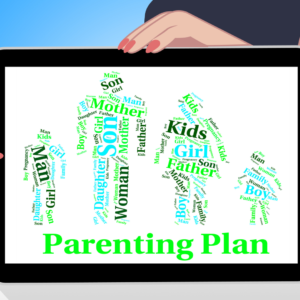In the complex world of co-parenting, some situations can be significantly challenging to both parents and, most importantly, their children. It is particularly difficult to co-parent in high-conflict situations. Navigating the shared responsibilities of parenting while also managing strained relationships requires a different solution. And one such approach that could work for you is parallel parenting. This method acknowledges the need to minimise direct communication between ex-partners, focusing instead on creating two separate but structured environments that prioritise the well-being of the children involved.
When Parallel Parenting Works Well
Parallel parenting is great for high-conflict co-parenting situations. This is where there is ongoing and intense conflict between parents who share the responsibility of raising their children, despite no longer being in a romantic relationship or living together. In these situations, communication between co-parents is frequently marked by hostility, aggressiveness, disagreement, and a lack of cooperation. The conflicts could be about anything and everything… parenting styles, decision-making, visitation schedules, financial matters, past relationship issues, new partners, extended families… the list goes on. In high-conflict situations, emotions are often heightened, and attempts to resolve disputes may lead to further escalation rather than resolution.
High-conflict co-parenting situations can have negative effects on the well-being of the children involved, as they may be exposed to tension, witness arguments, and experience challenges in adjusting to the complexities of shared custody or visitation arrangements.

Understanding Parallel Parenting
1. The basics of parallel parenting
Parallel parenting is a distinctive co-parenting strategy designed for situations where communication between ex-partners is strained, counterproductive, and often even aggressive. Unlike the traditional co-parenting model that emphasises collaboration and communication, parallel parenting allows each parent to function independently and do things their own way when the kids are with them with minimal to no contact between parents. This approach reduces the risk of conflict escalation and provides a more stable environment for the children.
2. Clear boundaries and roles
One key element of parallel parenting is the establishment of clear boundaries and sometimes even defined roles for each parent. Rather than engaging in constant communication and decision-making together, one way this could work is that each parent is responsible for specific aspects of the child’s life. Alternatively, both parents do things their own way when the kids are with them. This division minimises the potential for disagreement and promotes a more stable, and also predictable routine for the children when they are at each house.

3. Limited direct communication
In high-conflict situations, direct communication between ex-partners can often lead to arguments and negatively impact the children. Parallel parenting, however, mitigates this risk by limiting communication to essential information only, such as logistics or emergencies. Communication channels can even be structured through email or dedicated apps. This ensures that verbal communication can be avoided, and discussions remain focused on the child’s needs rather than personal disputes.

4. Consistency
Consistency is important in parallel parenting. Both parents stick to their routines, rules, and expectations, and this creates a sense of stability for the children. By minimising contact and maintaining separate households, the children experience a more seamless transition between homes, reducing stress and anxiety. For everyone!

Benefits of Parallel Parenting
1. Reduced conflict exposure
Parallel parenting minimises the children’s exposure to parental conflicts. This creates a healthier emotional environment for them. Shielding them from ongoing disputes allows them to focus on their personal growth and development without being caught in the crossfire.

2. Enhanced emotional well-being
For both parents and children, reduced stress from minimised direct interaction can contribute to improved emotional well-being. Parallel parenting acknowledges the reality that some co-parenting relationships may not be amicable, and its structure helps create a more peaceful coexistence for all.

3. Empowerment and autonomy
Parallel parenting empowers each parent to make decisions within their designated domain, fostering a sense of autonomy. This approach recognizes that both parents can contribute positively to the child’s life without the need for constant collaboration.
Tips for Successful Parallel Parenting
1. Create a detailed parenting plan
Establish a comprehensive parenting plan outlining each parent’s responsibilities, schedules, and decision-making authority. This plan serves as a roadmap for both parents, reduces ambiguity, and avoids the likelihood of future potential conflicts.

2. Utilise technology
Dedicated co-parenting apps or email can be valuable tools for exchanging necessary information without the emotional undertones of face-to-face or phone conversations. Embrace this technology to facilitate communication.

3. Prioritise the child’s well-being
Always prioritize the child’s well-being over personal grievances. By keeping the child’s best interests at the forefront, both parents can maintain a cooperative mindset even in challenging situations. Even if your ex doesn’t do this, try to be the bigger person and keep the kids out of your feelings for your ex. They will remember!
Parallel parenting offers an effective solution for families navigating high-conflict co-parenting situations. By acknowledging the need for structured independence and limited direct communication, parents can create a more stable and supportive environment for their children. The key lies in embracing the unique dynamics of parallel parenting and consistently prioritising the well-being of the family unit.
P.S. DID YOU KNOW?
You can also book one-on-one coaching with Julia Hasche from wherever you are in the world!
- Are you deciding whether to part ways with your partner and need some clarity?
- Have you just parted ways with your partner, and feeling lost?
- Have you been single for a little while now and need assistance with getting your life back on track and feeling empowered?
Click HERE to read about coaching and to hear from some others who have gone through coaching programs with Julia, and book in here for your 30-minute complimentary Clarity Call.
The purpose of the Clarity Call is:
- For me to get to know you and understand an overview of your current situation and where you are at.
- For us to establish what you need assistance with to move forward.
- To see if we are both comfortable working together.

Know someone who needs to read this? Share it with them via the links below.
